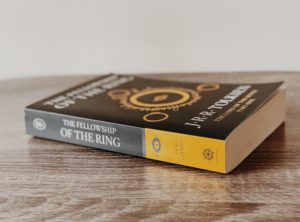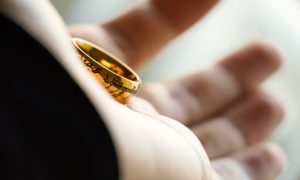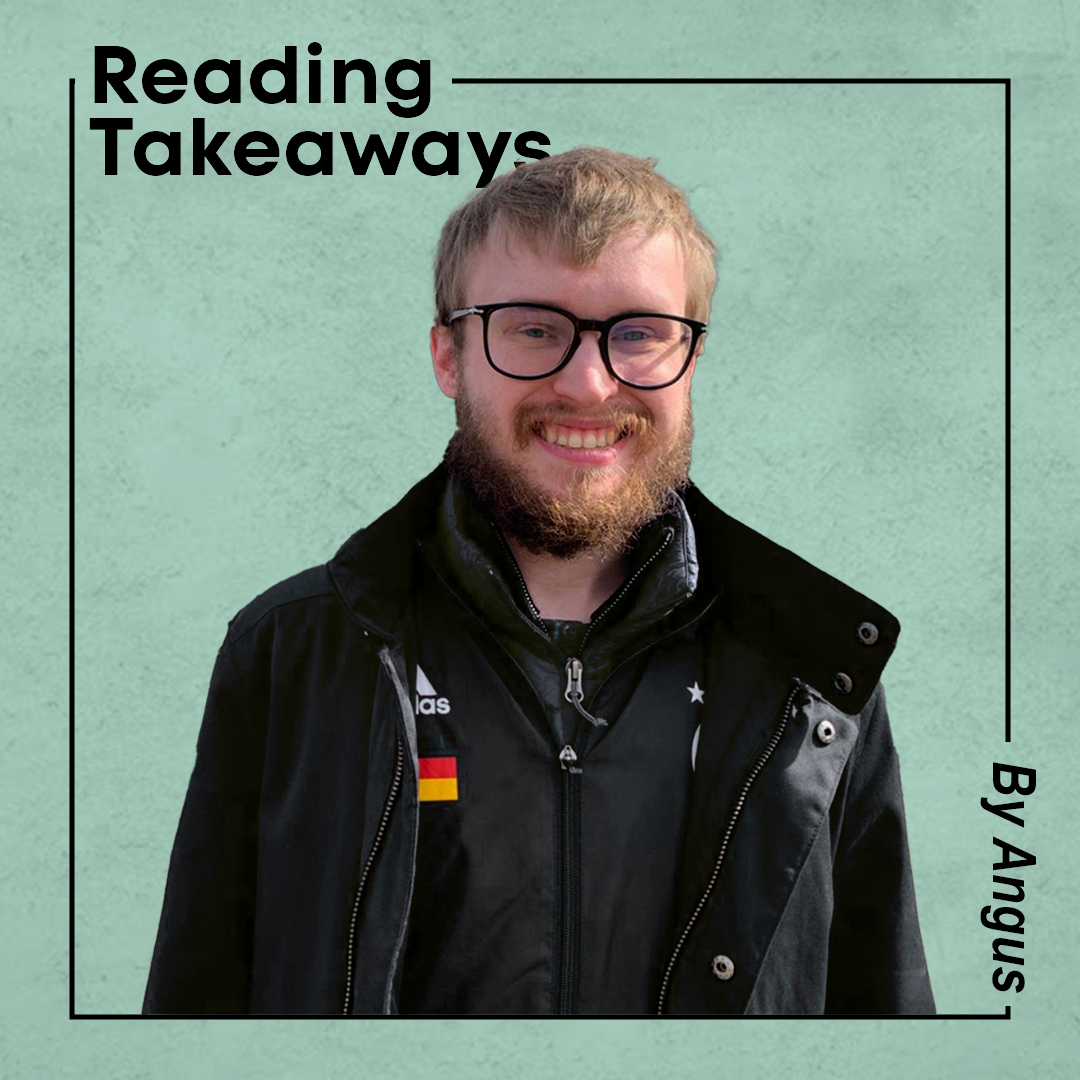CATEGORIES
#Education and Life Skills #Well-Being #Young LeadersOverview:
- Being hearing impaired, Angus shares the learnings he found in reading.
- The beauty of fictional worlds showed Angus parallels to real-life situations, teaching him many things from a young age.
- Lessons of strength and solidarity inspired Angus to understand the challenges in life from a different perspective.
Silent Nights
I’m deaf. This wasn’t always the case; when I was about one year old, I contracted bacterial meningitis which ossified my cochlea–a part of the inner ear–and rendered me unable to hear. When I was about two years old, doctors surgically added a cochlear implant (a cybernetic prosthetic speech processor), enabling me to hear.
As part of my childhood education, I read voraciously to overcome the disadvantages that came with my disability. Literacy and reading comprehension rates are consistently lower for the hearing impaired.
I experienced challenges at first, as difficulties in hearing words translated into difficulties recognizing written words. A turning point occurred when I was perhaps five or six years old. Having run amok one afternoon, I immersed myself (and my processor) in an inflatable pool.
My processor—not particularly water-resistant at the time—required several hours of drying. While the processor dried, I was unable to hear; at bedtime, I was both unable to listen to a bedtime story and unable to read one myself. My resolve to not face such a travesty again grew after that night.
Literacy is not an easy skill to learn, however, even for those who possess no disability. I was helped immensely not only by my parents, who took it upon themselves to learn American Sign Language to help bridge the gap between visual and audible words, but also by a whole crew of teachers and support specialists.
Together we practiced enunciation, such as the differences between F and V sounds, and how every word on the page had its own name and its own meaning. Line by line we practiced; with their help, I even cut out every word from a short story and pasted them back in order. I still have that Frog and Toad adventure, kept safe within my childhood memorabilia.
Fortunately, these efforts were not in vain. I grew to love reading as a child—so much so that I recall in the third grade asking my teacher to create new reading awards. Each student earned an award for reading a certain amount during the year, and I read more than any of her previous students had ever read.
As my passion for reading grew, my abilities grew with it; my parents would frequently enter my room past bedtime to take the flashlight I had lit under the sheets, and in class, I grew capable of reading the more advanced material that was available.
The Moral of the Story
As is common, I began forming opinions about what was right and what was wrong from an early age. I read many books, primarily fiction such as Peter Pan, Great Expectations, Eragon, and—my lifelong favorite—The Lord of the Rings (by J.R.R. Tolkien). In these stories I met indignant children, inspiring heroes, and gentle souls alike.
Everyone takes note of what their favorite characters do, and I was no exception. I loved the archaic, flowery language in which they spoke (perhaps too much, as some of my later teachers have lamented), whether they were Dickensian orators or fantastical characters from another world.
I also loved the bravery and daringness of the protagonists, which is surely unsurprising among young boys. But more subtly—and perhaps not cognizant at the time—I loved the strength of those idealized characters. Not their strength of arms, like a G.I. Joe combatant, but their strength of heart and mind, like—well—a G.I. Joe character (because knowing is half the battle!).

For an example of such a character, one needs to look no further than Aragorn from The Lord of the Rings. It might be tempting to dismiss him as the male equivalent of a Mary Sue character: heir to the throne of Gondor, the predominant human kingdom in the setting (special by birth, check); a skilled swordsman, archer, tracker, and poet, amongst other talents (lack of obvious weaknesses, check); his father, mother, and every relative for 63 generations is dead (sad backstory eliciting sympathy, check). But it is Aragorn’s actions, not anything related to his backstory or abilities, which are praiseworthy.
Positive Masculinity
By typical standards, it seems that Aragorn ought to be the protagonist of The Lord of the Rings, carrying the titular ring to its destruction. Aragorn’s heroism and strength of character, however, are embodied by his capacity to care about others.
One of Aragorn’s most iconic moments of compassion is when his companion Boromir dies, slain by servants of an evil wizard. It’s a classic trope, borne out countless times in books and film: one man lies dying next to another, exchanging final words and promises.
It’s an often-touching trope, with heroes clasping each other’s hands, or sometimes even embracing each other in a final bro-hug. But Aragorn elevates the trope one step further; unafraid to show platonic love (a recurring theme in Tolkien’s The Lord of the Rings), he kisses Boromir’s brow as he lies dying.
There is an admitted lack of homosexual representation in Tolkien’s works, but where he makes up for it is in his depictions of platonic love between men. Even after Boromir dies, Aragorn continues to show his love for him with a 30-line funeral dirge sung alongside his remaining companions.

Few would question that men and women are often born into entrenched gender roles, roles that frequently limit people from universally human experiences. Tolkien subverts these roles somewhat in The Lord of the Rings. Aragorn, to use his example again, is not only a skilled combatant (as many archetypically male characters are) but also a skilled healer.
These healing capabilities are shown both before and after Aragorn completes his journey to Gondor. In the wilds, when Aragorn has forsaken many of the comforts and responsibilities of rulership, Aragorn tends his companion’s wraith-inflicted wounds. In Gondor’s Houses of Healing, he again takes a break from other leadership roles to attend to and care for other’s wounds.
Although tending to others and being compassionate are traditionally feminine roles, an oft-repeated line in The Lord of the Rings is that “the hands of a king are the hands of a healer.” Within his works, Tolkien illustrates that being caring and tender are not gendered qualities.
Lessons on the Patriarchy
To understand some of Tolkien’s perspective when writing The Lord of the Rings, we would do well to remember the defining conflict of the early 20th Century: World War 1. Tolkien was at Oxford at the time of the war and had made several close friends there. While initially, it might have seemed to be a grand adventure for him and his friends to go away to far-off lands, their stories took tragic turns when several of his friends died.
Having fought in the trenches of the Somme and witnessing firsthand the futility of old ways of thinking—as evidenced by the motto “dulce et decorum est pro patria mori” (it is sweet and proper to die for one’s country)—several parts of his works may have been written in response.
Consider again the entrenched social norms in Tolkien’s lifetime: women would have stayed at home (in deference to their husbands) and men would have gone to work—or war, as the case may be (themselves in deference to aristocratic superiors). To continue our list of subverted gender roles, one needs to look no further than shieldmaiden Eowyn: when her friends and family leave for war, she is tasked to stay behind and tend to the weak who remain.
Eowyn ignores this directive, choosing instead to ride alongside the others whilst disguised—even taking Merry, another companion who had been tasked with staying behind (due to his short stature).

By rebelling against her orders, she highlights similarities in male and female psyches: regardless of gender, people do not like to be considered too weak to help. Indeed, she and Merry prove themselves to be more capable than anyone had imagined when facing the prophetically invincible Witch King, prompting a Shakespearean exchange of dialogue: “No living man may hinder me!” quotes the Witch King from ancient prophecy; “But no living man am I!” replies Eowyn in turn.
Seeing these tropes subverted from a young age instilled in me a skepticism of traditional gender doctrine. Why should anyone be relegated to certain roles because of their gender? Female characters can be strong, and male characters can be tender.
What the Heart Wants
Yet Tolkien wrote further moral insights within his works: it was not sufficient to be strong physically; one also had to be strong of heart. Two characters illustrate this lesson clearly, Boromir (a noble from Gondor and commander of its armies) and Galadriel (an elf queen possessing peerless sorceries).
Both are noble-born, powerful, and desire to help others. When faced with the choice to obtain the titular ring (an evil artifact bestowing immense power) however, both react differently. Boromir is proud of his capabilities and believes that he would not succumb to the ring’s evil aura, which—ironically—precipitates his downfall; Galadriel reflects on her desires and recognizes that—despite her strength of mind—she would eventually become evil if she claimed the ring. A recurring theme within The Lord of the Rings is that humility is a necessary companion to strength.
It is humility that enables us to grow; those who lack any humility are unable to recognize their own weaknesses and improve upon them. To be clear, this is not mutually exclusive with confidence, bravery, or any such similar qualities.
For example, in an opposite manner to World War 1 commanders, many of Tolkien’s most noble characters display humility by eschewing the privileges of their position and commanding from the front lines. Even after returning from war, Aragorn rejects full credit at his coronation, choosing instead to highlight the accomplishments of others and bowing to them. Aragorn is an unquestionably brave and confident character, yet recognizes that no person can do everything alone.
Conclusion:
I am fortunate to have had lots of help in my life, including from my parents, my friends, and the resources I had access to—such as the books I learned to read. Without my fictional companions, I might have still learned the lessons that they taught—but not nearly as quickly, nor as memorably. I have only scratched the surface of what I learned from the pages I gazed upon in my formative years, but hope that you—reading this right now—might likewise be imparted with helpful thoughts. Everyone has their own challenges, trials, and tribulations, and yet each of us also possesses the capacity to help others. Overcoming our obstacles doesn’t always have to be done on our own; even the strongest amongst us cannot do it all. It is not a sign of weakness to accept help, but rather the opposite. Strength is not what you or any one person can do alone, it is what you can all do. Together.


